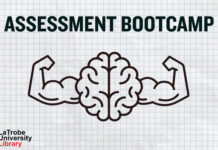It’s assignment season and they’re coming in hot. Get across these 13 steps for nailing your next assignment.
1. Understand the goal posts
Read your subject learning guide and get to know the expectations. Check penalties for each day late, and the last date an assessment is accepted for marking. See instructions for each assessment and its marking grid to get your head around what you need to do. Check minimum word counts and reading or references required.
2. Pause and strategise
Consider your goals and where you’re at for each subject. Perhaps one assignment is weighted more heavily than another, or you need to boost your grade in a particular subject.
Create a map and choose where you want to spend your time. There are plenty of apps out there than can help you plan and track your schedule – these are super handy and definitely worth the download. The earlier you plan, the less stressful your assessment prep is going to be.
3. Manage your time and look for flexibility
I schedule my study, but I also schedule free time for things like watching a movie. So when I do get free time I know what I want to do and don’t waste time because that’s what I planned to do.
Lyla, La Trobe Albury-Wodonga student
Ration your TV and internet time, and take time to look after yourself – it’s the key to success. Block out chunks in your schedule for studying. Be realistic about how many hours you can study for. You can’t study for ten hours straight, you’re not a robot, and if you try to be, you could just become a zombie.
Let family and friends know about your assessment dates so they can better support you during this time. Get to know a few tips and tricks for managing your workload to help you stay on track.
4. Create an assignment schedule
Calculate how much time you’ll need to put aside using La Trobe’s very own Assessment Planner. Enter your subject code and this handy online calculator will break your subject down into achievable tasks and provide a timeline for completion.
The best part? You can enter your own start date. This is especially useful if you have multiple assignments due at the same time. Once you have your schedule, organise a friend or peer to be your “deadline motivator” and check in with them regularly to help you stay on track.
5. Review the assessment criteria
To determine what you’re being assessed on, review the assignment’s marking criteria. Find this information for each subject on the LMS in your subject learning guide.
6. Understand the question
You may have written an absolutely brilliant piece of work, but if it doesn’t properly address the question, you won’t be rewarded for it. Remember to re-read each question a couple of times before you answer it, underlining important wording so you know exactly what’s being asked of you. Keep coming back to the question as you go to make sure you’re not going off on a tangent.
7. Plan your approach first
What are your main points? What kind of evidence will you need to find to back up your claims? Are you going to need to do further research before forming your argument? Which style of referencing are you meant to use? So many questions!
Planning out your approach to your essay or assessment beforehand will keep you on track, provide structure and prevent you from feeling lost down the line. Library Learning Services is the best port-of-call for helping you to map out your assignment’s structure.
8. Don’t leave referencing until the last minute
Reference as you go, people. We repeat, reference as you go. Don’t wait until you’ve finished your assignment. Otherwise, you’re setting yourself up for a bad time.
Underestimating the time it takes to properly format your references, and write in-text citations, is a common trap to fall into. The easiest way to avoid losing marks unnecessarily is to allocate enough time as you go to get it right. Remember to paraphrase correctly and include enough references to support your argument.
If you need help, reach out to Library Learning Services and get tips on referencing from expert staff.
9. Proof your work
Sometimes all you need is a break and a fresh set of eyes. Proof your work after you’ve written it, and leave time to have a break before you do so. If you can afford to leave a full day before reviewing your work again, do it. You might be surprised by the things you couldn’t see before. Ask a friend or family member to check for typos, spelling and grammar, or read it aloud.
La Trobe students also have access to a free online assignment help service called Studiosity. Online experts are available at all hours to provide feedback on your individual assignment or to answer your questions via live chat.
Studiosity – free online assignment help and live chat for La Trobe students
92% of students say they feel more confident after using Studiosity. Never heard of Studiosity? Commit the name to memory immediately and learn where to find it in the LMS. It’s online help with experts who can help answer your questions, provide feedback and tips for your assignments and mor
10. Leave plenty of time to write your assignment
Very few people are able to do their best work writing their assignment at the eleventh hour. Not managing your time well and leaving your assignment til the last minute can result in an incredibly stressful experience.
Breaking down your assignment into smaller, manageable tasks is the key to being productive – head to La Trobe’s Assessment Planner for help.
11. Remember the word count
Got too much to say or not quite enough? You can lose marks for both not meeting the word count and going over it. Markers usually allow a buffer of 10%, which means if your word count limit is 1,000 words, you can go up to 1,100 words or down to 900 words. Check with your subject coordinator, lecturer or tutor to see if this rule applies to you.
12. Submit your work before the deadline
We’ve all seen those Turnitin screenshots showing assignments being submitted 1 second before the deadline. While it is a little funny, you definitely don’t want to be in that situation. It’s super stressful, especially if your WiFi decides to pack up and go on hiatus minutes before the assignment is due.
Missing the deadline will result in lost marks that would have been a given if it was on time. Submit early, with enough buffer time in case something goes wrong. If you’re experiencing circumstances that might prevent you from submitting on time, contact your subject coordinator or lecturer and discuss it with them before the deadline.
13. Be proactive and seek out help
Asking for help is a good thing, it means you care about your work.’
Nick, Peer Learning Adviser and third year Physiotherapy student
You don’t need to wait until you’re struggling to seek support – and there’s plenty of support at your fingertips at La Trobe.
Everyone at La Trobe wants you to succeed. Get across the academic support available to you, from Peer Learning Advisers (PLA) to subject coordinators. If you’re feeling overwhelmed, stressed, or just need someone to chat to, La Trobe offers free counselling for all students.
Help will always be given at
Dumbledore if he were a La Trobe Professor, probablyHogwartsLa Trobe to those who ask for it.”
If you have questions about your assignments, don’t be afraid to ask your lecturers or tutors. If you’re not sure if you’re allowed to ask them about a certain aspect of your assignment, do anyway. The worst they can say to a request is no, and you haven’t lost anything by asking.
Get help online from Library Learning Services. You can book a one-to-one appointment with an Academic Skills and Language Advisor or Librarian, or drop in to the Maths Hub, Science Hub or Coding Hub. You can also get writing feedback 24/7 via the team at Studiosity.
We’re all in the same boat and you’re not alone.”
Lyla, La Trobe Albury-Wodonga student














